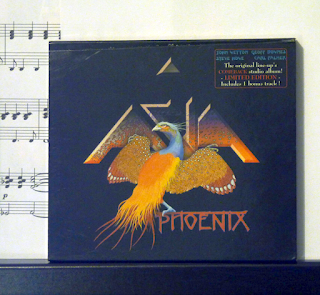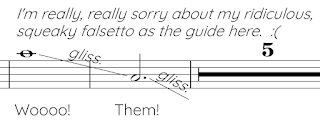Naturally, after mentioning it in my last post, I ended up putting on Asia's Phoenix that evening. I found it strangely instructive to revisit, largely by way of an accident.
 |
They fly now?!
|
In track 6 of 12, "I Will Remember You" (which is probably the album's weakest track anyway), I couldn't help noticing that John Wetton's vocal part comes within a stone's throw of quoting ABBA's "I Wonder (Departure)" at one point. I was so startled by this, I couldn't resist pausing the Asia album and pulling out the liner notes to my copy of ABBA: The Album, to see if the lyric was actually the same. For the record, one word of the lyrics is different but the melodies are identical for 2 whole bars!
I then took a bathroom break before resuming the Asia album. And I was surprised, after having taken a break, at how enjoyable I found the second half. I'd always thought of Phoenix as one of those "front-loaded" albums where the most gripping material is crammed into the first 40% or so of the track listing, but it turns out that impression was largely due to the album's exhausting, relentlessly dense production. Simply approaching the second half refreshed allowed me to appreciate its highlights a whole lot more.
If it'd been up to me, the cover of "Orchard of Mines" would be track 6 or 7 instead of track 10, as it's the closest any track on Phoenix gets to being sparse enough to function as a mid-album breather. As it is, the album basically doesn't have one.
(Don't worry. I do not plan on seeking out a hard copy of any other Asia album.)
Anyway, when I first began pondering the possibility of a third Escapade last year, I initially planned on leaving out "Modern Art" altogether, due to the piece's particularly embarrassing history. I now realize that would have been a mistake. The presence of a relaxing, refreshing, but not too jarring, interlude is a good thing in this kind of music.
The other option, of course, is to have "breather" passages within long pieces. "I Get Up, I Get Down" from Yes' Close to the Edge is one of the most masterful examples, and interestingly I'm reminded of it every time I reach the slow section of the first movement in Mahler's Symphony No. 6. That was completed in 1906, by the way: I'm sure that retaining audiences' attention has always been a subtle art.
I'd say the "dedicated breather track" option is the safer option to take. And, well, the Chronicles of a Dead End version of "Modern Art" just happens to have been conceived as such from the start!
The only slightly difficult thing about turning "Modern Art" into an instrumental is that it has 5 verses, a consequence of the original poem's length, and thus could get boring if done too slavishly. The solution I hit upon was for verses 1, 3 and 5 to mimic the original Escapade vocal as closely as possible, but for verses 2 and 4 to be improvised variations on it. What I ended up with does not disappoint. And no, I did not subject a professional guitarist to my misguided attempt at a falsetto vocal. I transcribed it myself.
Drums are coming next.


